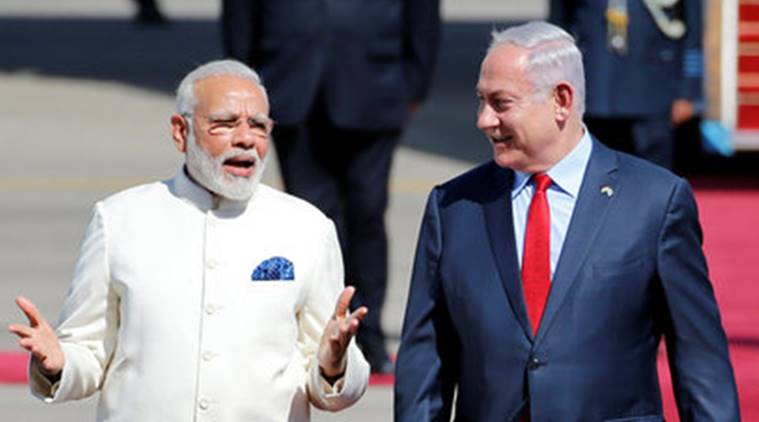Security and real politik
July 6, 2017 | Expert Insights

Indian Prime Minister, Narendra Modi is currently in Israel, making this the first time an Indian PM has visited the state.
Israel, for its part, has rolled out the kind of generous reception that it generally reserves for visiting American presidents and the Pope. The two countries announced seven agreements and the visit has been deemed a success.
However, it is striking to note that both countries were non-committal about cross-border terrorism in the joint declaration.
Background
As detailed earlier, India did not pursue bilateral relations with Israel for decades. India’s distance was largely due to the country’s not wanting to upset its equation with Arab nations. It was only in 1992 that the nations established diplomatic ties.
And while it has only been 25 years, the relationship has flourished. Military trade agreements have formed the backbone to this equation but in the recent years the two have cemented strong partnerships in agricultural sector as well.
Analysis
Among the highlights of the visit was the creation of the $40 million innovation fund will aim at bettering investments in the technology sector. They also discussed cyber security and bilateral defence cooperation and joint development of defence products. They also signed three specific agreements with regards to space technology. This clearly shows that India is able to offer technology to advanced countries.
The leaders even touched upon terrorism if only briefly. PM Modi said, “Prime Minister Netanyahu and I agreed to do much more together to protect our strategic interests and also cooperate to combat growing radicalisation and terrorism, including in cyber space.” However, Israel did not specifically offer its support to India for dealing with Pakistan or Kashmir and India for its part kept a diplomatic silence about Palestine and Hamas.
That isn’t to say that the topic of terrorism was not broached. Modi and Netanyahu had a meeting with Mossad chief Yossi Cohen where the focus was on increasing security cooperation to counter the threat of Islamic State. Netanyahu also raised the ongoing investigation into the 2008 terror attack that took place in Mumbai that resulted in the deaths of Rabbi Gavriel and Rivka Holtzberg.
But a larger analysis of the visit would note that this was largely about technological and economic cooperation.
Assessment
Our assessment is that even when nation states have converging interests in issues that affect them, as security in this case, they are at times compelled to remain silent about it. Both Israel and India have been careful in avoiding a joint declaration on cross-border terror. India is sensitive to labelling Hamas as a terrorist organization and in the same vein Israel has also reluctant to name Pakistan as a state that sponsors cross-border terrorism. This can only be attributed to the fine art of diplomacy that both countries chose to adhere. Ironically, India is the largest buyer of weapons from Israel and has often borne the brunt of cross-border terror. Israel is also vulnerable due to cross-border attacks from its neighbors.








Comments